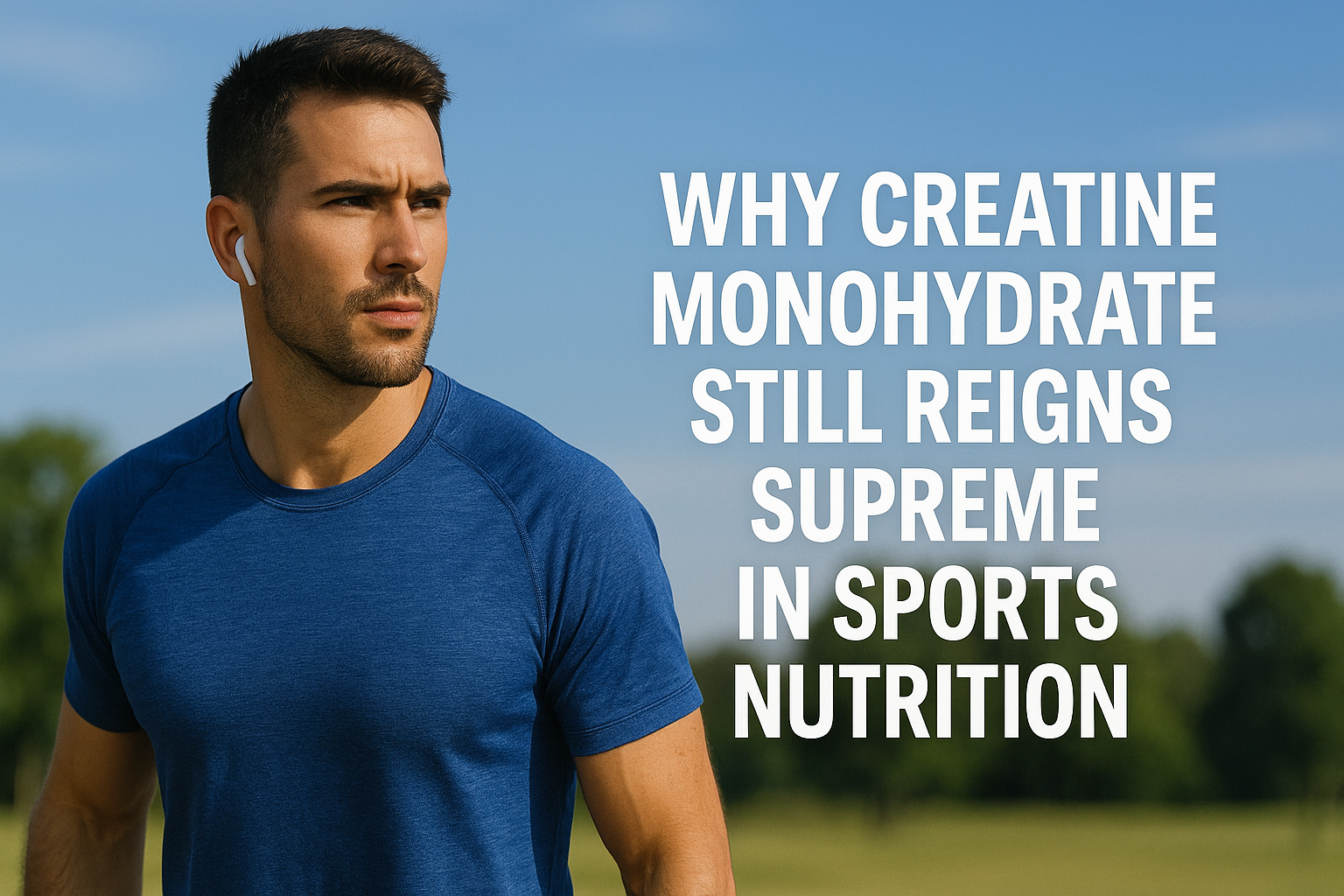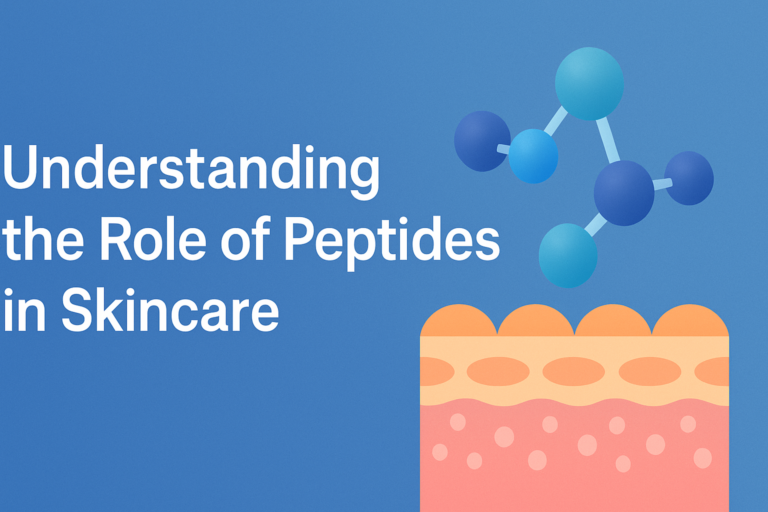
Creatine monohydrate is nutrition science at work. Backed by decades of clinical research, it remains the gold standard in sports performance for one reason: it works. From ATP regeneration to muscle recovery to brain energy metabolism, creatine monohydrate offers foundational support for strength, clarity, and cellular resilience.
If you’re optimizing how you train, think, or recover, creatine should be the first thing in your fitness toolkit. Here’s why creatine monohydrate still dominates the sports nutrition world—and how to make it part of your daily stack.
What Is Creatine Monohydrate and Why Does It Matter in Nutrition?
Creatine is a naturally occurring compound made from three amino acids: arginine, glycine, and methionine. It’s produced by the liver and kidneys, then stored mostly in muscle tissue—where it helps fuel high-intensity movement and rapid energy demands.
While it’s not classified as a vitamin or essential nutrient, creatine plays a vital role in cellular energy metabolism. It’s best known for powering the phosphocreatine system, a rapid energy pathway your body uses during short bursts of activity—like lifting, sprinting, or even cognitive effort.
Supplementing with creatine monohydrate increases your intramuscular creatine stores, giving your body more of what it already uses to perform, recover, and regenerate energy—especially when dietary intake or natural synthesis isn’t enough to meet demand.
How Does Creatine Monohydrate Work?
Once absorbed, creatine is stored in your muscles—mostly as phosphocreatine, a compound your body uses to rapidly regenerate ATP (adenosine triphosphate), your main source of cellular energy.
During high-intensity efforts, your body relies on this fast-acting energy system to perform. Here’s how it works:
- ATP is depleted quickly during short, explosive movements (e.g., sprinting, lifting, HIIT).
- Phosphocreatine donates a phosphate group to help rebuild ATP in seconds.
- This cycle repeats rapidly, helping you push harder and recover faster between bursts.
Your brain and other high-demand tissues also draw on this system to maintain cognitive focus and reaction time under stress.
By supplementing with creatine monohydrate, you increase your intramuscular creatine stores, which leads to:
- greater ATP regeneration capacity
- improved short-term endurance and power output
- delayed muscle fatigue
- stronger performance adaptations over time—including better strength, recovery, and lean mass gains
What Makes Creatine Monohydrate the Most Researched and Trusted Form?
Creatine monohydrate is the original—and still the most extensively studied—form of creatine available. It’s backed by decades of clinical research and has consistently outperformed newer variants in both efficacy and safety.
Multiple meta-analyses and reviews confirm that creatine monohydrate:
- improves strength, power, and lean mass gains across training populations
- is just as, if not more, effective than “designer” alternatives like creatine ethyl ester, liquid creatine, or buffered forms
- remains the gold standard in terms of absorption, safety, and cost-effectiveness
What gives creatine monohydrate its edge:
- High bioavailability – It dissolves well and is absorbed efficiently in the gut
- Proven stability – It holds up well when stored properly, with minimal degradation in dry form
- No added compounds – Unlike buffered or liquid forms, it doesn’t require additives to remain effective
Buffered creatine and liquid creatine often claim improved absorption, but head-to-head studies show no performance benefit over monohydrate—and, in some cases, reduced effectiveness due to breakdown during storage or digestion.
When purity, cost, and proven results all matter, creatine monohydrate continues to be the most trusted form in sports nutrition.
What Are the Nutritional Benefits of Creatine for Performance and Recovery?
Creatine monohydrate supports performance and recovery by fueling short-term energy production, improving hydration inside muscle cells, and aiding repair. It’s one of the few supplements shown to benefit both physical output and cognitive function.
These are the key benefits that make it a staple in performance nutrition:
- Muscle strength and hypertrophy
Creatine increases your muscles’ phosphocreatine stores, allowing you to regenerate ATP more efficiently during training. This supports heavier lifts, more reps, and greater overall training volume—key drivers of strength and muscle growth. Long-term use in resistance training programs consistently leads to measurable increases in lean muscle mass.
- Neurocognitive enhancement
Creatine also supports brain energy metabolism, especially during periods of mental fatigue or sleep deprivation. Studies have shown improvements in working memory, reaction time, and mental clarity, particularly in tasks that require sustained attention or quick decision-making.
- Improved recovery markers
Supplementing with creatine may reduce exercise-induced inflammation and muscle soreness. Some studies suggest lower levels of creatine kinase and C-reactive protein post-workout, along with a faster return to baseline strength following intense sessions—indicating better recovery capacity.
- Hydration and cell volumization
Creatine draws water into muscle cells, increasing cellular hydration and volume. This effect supports nutrient delivery, muscle fullness, and an intracellular environment that favors protein synthesis.
How Does Creatine Fit Into a Nutrition Plan or Supplement Stack?
Creatine monohydrate works best when it’s part of a bigger nutritional picture. Here’s how to build around it for maximum impact:
Carbohydrates for uptake
Taking creatine with carbs—especially post-workout—can enhance muscle creatine uptake by increasing insulin activity. This is why creatine stacks so well with a carb-heavy recovery shake or a balanced meal containing fruit, oats, or starchy vegetables.
Protein for repair
Creatine doesn’t replace protein—it complements it. While creatine fuels your ability to train harder, protein provides the amino acids needed to rebuild. Pairing both post-exercise can support better recovery, strength gains, and muscle repair.
Timing: pre vs. post
Research shows that both pre- and post-workout dosing can be effective. Some studies suggest post-workout creatine may offer a slight advantage in terms of lean mass and strength improvements, especially when combined with carbs and protein. The bigger factor? Consistency over timing—what matters most is daily use.
Electrolytes and hydration
Creatine pulls water into muscle cells, which increases your hydration needs. Pairing it with sodium, potassium, or magnesium helps maintain fluid balance and supports optimal absorption—especially during intense or high-volume training.
Collagen and peptides for recovery
If you’re stacking for performance recovery, creatine works well alongside collagen peptides or amino acid blends. This combination supports joint, tendon, and soft tissue repair while creatine helps maintain muscle performance during injury recovery or heavy training phases.
FAQ: Creatine Monohydrate Nutrition
1. Why is creatine not bad in sports?
Creatine is legal, well-studied, and naturally occurs in the body. It’s approved by major sports organizations and has no performance-enhancing drug classification. It simply helps your muscles produce energy more efficiently.
2. Do elite athletes take creatine?
Yes. Many elite athletes across strength, endurance, and team sports use creatine to support training volume, recovery, and performance. It’s one of the most commonly used and researched supplements in professional athletics.
3. Are there any negatives to creatine?
Most people tolerate creatine well. Some may experience water retention or mild digestive discomfort, especially with high loading doses. Staying hydrated and using a consistent daily dose helps minimize side effects.
4. Can you still gain muscle without creatine?
Yes—but creatine can accelerate progress. It enhances your ability to train harder and recover faster, which supports muscle growth over time. Without it, you can still build muscle—it just may take longer.
5. Is creatine safe for the heart?
Current research shows no harmful effects of creatine on heart health in healthy individuals. Some studies even suggest it may benefit cardiovascular function by improving energy availability in heart tissue.
Make Creatine Monohydrate Part of Your Daily Nutrition with Peak Human Gummies
Creatine works best when it’s consistent—and that starts with a format you won’t skip. Peak Human’s Creatine Monohydrate Gummies deliver a clean, full-dose solution that fits seamlessly into your daily performance stack.
Each serving packs 5g of creatine monohydrate to support cellular energy, muscle recovery, and cognitive output—without powders, pills, or prep.
Why it works:
- Clinically backed dose – 5g creatine monohydrate for strength, stamina, and mental clarity
- Zero-friction format – Just grab and go; no scoops, no mess
- Clean formulation – Vegan, third-party tested, no synthetic dyes or fillers
- Stack-smart design – Pairs well with protein, carbs, electrolytes, and recovery tools
If you’re serious about results, these gummies make creatine simple, effective, and easy to stay consistent with.
Become a Member
Access exclusive protocols, research, and tools built for recovery, performance, and longevity.
Subscribe for Updates
Be the first to get clinical insights, supplement launches, and actionable strategies.






/5Total reviews
Persons recommended this product
Filter by
star Rating
attach_file Attachments
Anonymous
Shopper
check_circle Verified
Shop owner replied
Was this helpful
Facebook
X (Twitter)
LinkedIn
Reddit
Copied to Clipboard
Anonymous
Shopper
check_circle Verified
Shop owner replied
Was this helpful
Facebook
X (Twitter)
LinkedIn
Reddit
Copy Link
Thanks for your review!
Your feedback helps us improve our service.
There are no reviews yet.
Be the first to review “ ”
Only logged in customers who have purchased this product may leave a review